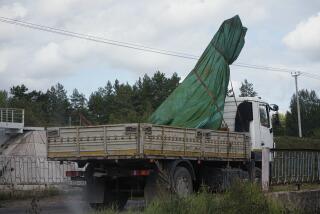Send Condolences to Families of Shuttle Crew : World Leaders Express Sympathy Over Tragedy
- Share via
World leaders, including Kremlin chief Mikhail S. Gorbachev, sent telegrams to President Reagan on Wednesday expressing condolences to Americans and the families of the seven Challenger space shuttle crew members who died in history’s worst space disaster.
But while Poland’s Communist government said it was shocked by the explosion of the Challenger, official commentaries in the Polish state press Wednesday sought to link the loss of the Challenger to an American rush to “militarize” outer space and said the crew members who perished do not deserve to be counted among space pioneers.
China conveyed its “deepest sympathy” following the explosion Tuesday, a tragedy given prominence on television screens and newspaper front pages in many Communist as well as Western countries.
Pope Tells Sorrow
Pope John Paul II said the loss of the shuttle crew had caused profound sorrow in all people and asked for prayers for them and their families. Speaking at his weekly general audience in the Vatican, the pontiff expressed his solidarity with the American nation.
Many nations urged the United States to continue its space program despite the staggering loss. Rude Pravo, newspaper of the ruling Czechoslovak Communist Party, said the death of the crew was the “toll paid by man in his effort to unveil the mysteries of outer space.”
“In this sense,” the newspaper said, “the tragedy of Challenger is accepted with deep sorrow the world over.”
Danish Defense Minister Hans Engell, chairman of the North Atlantic Treaty Organization’s European group, said, “We in Europe are deeply shocked and express our heartfelt sympathies with the American people and the families of those who died.”
Gorbachev’s Telegram
In a telegram to Reagan reprinted by the official Soviet news agency Tass, Gorbachev said, “We partake of your grief at the tragic death of the crew of the space shuttle Challenger.”
Soviet space officials also expressed sadness over the explosion of Challenger. “All of our space officials are deeply grieved about this and we are waiting impatiently for more information,” a spokesman for the Institute for Space Studies said.
Soviet cosmonauts, who shared a joint Apollo spacecraft mission with U.S. astronauts in 1975, sent a message of “profound condolences to the American colleagues and the families of the deceased.”
It was signed by Vladimir Shatalov, a former cosmonaut and head of space training, and other former Soviet spacemen on behalf of all Soviet cosmonauts.
Muscovites Saddened
Soviet television broadcast film of the explosion of Challenger just after liftoff for the 25th mission of the U.S. shuttle program. Muscovites expressed shock and sadness as they watched the spectacular explosion.
However, two commentaries, by the Polish government news agency PAP and the armed forces newspaper, marked the first effort by state-run news media in Soviet bloc countries to use the disaster for political propaganda, Times correspondent Robert Gillette reported from Warsaw.
The shrill commentaries contrasted with condolences that the Polish leader, Gen. Wojiech Jaruzelski, expressed in a telegram Wednesday to Reagan, and also with the generally factual reporting of the disaster by official media in the Soviet Union and other East European countries.
‘Domination in Space’
“The deaths of seven American astronauts cannot be included in the category of tragedies experienced by pioneers who, throughout history, have attempted to perfect the inventions of human hands,” the Polish armed forces newspaper Zolnierz Wolnosci (Soldier of Freedom) said.
“Consciously or unconsciously they participated in a program aimed at achieving domination in outer space, for victory in a future confrontation on Earth (through) the ‘Star Wars’ of President Reagan,” the newspaper declared.
A commentary by the PAP news agency suggested that Tuesday’s disastrous launching should have been postponed, but could not have been, given the “definite imperatives” of “military programs which are part of the ‘Star Wars’ (space-based anti-missile system) strategy.”
Nakasone’s Condolence
Telegrams of condolence were sent to Washington by Japanese Prime Minister Yasuhiro Nakasone and Foreign Minister Shintaro Abe.
But the astronaut to receive the most attention Wednesday was Ellison S. Onizuka, the first Japanese-American to go into space, Times correspondent Andrew Horvat reported from Tokyo.
“This is all the more unfortunate for us because we knew Onizuka well and we knew what a good person he was,” said Mamoru Mori, one of three Japanese astronauts who had been undergoing training for a flight scheduled on the ill-fated Challenger in 1988.
In Bonn, West German Chancellor Helmut Kohl sent a telegram to Reagan with his condolences to the families of the astronauts, Times correspondent William Tuohy reported. “The German people grieve with you and all Americans,” the chancellor said.
The government Research Ministry said it was postponing a recruitment drive for six new German astronauts to take part in a 1988 space shuttle mission. Two German astronauts supervised the scientific side of a seven-day shuttle mission last October.
About 1,000 persons had already expressed interest in the 1988 mission, a research ministry spokesman said.
“We must find the cause of the accident and safety must be established,” said a spokesman for the West German Experimental Aerospace Research, which directed experiments on the October mission.
Germans Saw Telecast
Most West Germans saw the explosion of the Challenger on their television screens as the videotape was broadcast repeatedly Tuesday night and Wednesday morning.
In Paris, Premier Laurent Fabius told a luncheon meeting of American and British journalists that he was “shattered” by the experience of seeing, on television, the explosion of the Challenger, Times correspondent Stanley Meisler reported.
“It’s a reminder that in the end we have limits,” Fabius said, “and that sometimes we may not be as advanced as we think we are.”
More to Read
Sign up for Essential California
The most important California stories and recommendations in your inbox every morning.
You may occasionally receive promotional content from the Los Angeles Times.













